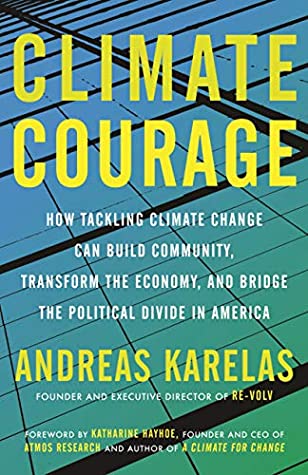
Climate Courage
How Tackling Climate Change Can Build Community, Transform the Economy, and Bridge the Political Divide in America
کتاب های مرتبط
- اطلاعات
- نقد و بررسی
- دیدگاه کاربران
نقد و بررسی

March 15, 2021
A green energy advocate promotes environmentalism to conservatives. In this debut nonfiction book, Karelas makes a case for green energy and environmental protection within a framework that aligns with many conservative values. The volume opens with a pop-psychology-driven argument in favor of approaching climate change with optimism about opportunities for making progress instead of focusing on the bleak future of inaction. The author then moves into a historical look at Republican support for environmental initiatives and points out the faulty logic of climate change denial ("This argument is equivalent to not believing the doctor who says you have a broken arm if it means you have to wear a cast all summer"). Subsequent chapters look at the shift toward clean energy from the perspectives of national security, job creation, faith, and community, with examples of successful programs supported by people and groups with a range of political perspectives, including the nonprofit Karelas runs. The author concludes that a bottom-up approach to adopting clean energy is the most effective ("The only way to ensure that new sustainable ways of living are woven into the fabric of our culture"), making it a good fit for the conservative goal of minimal government intervention. He suggests that if conservatives are approached in an empathetic and emotionally intelligent way, it is almost inevitable that they will agree that embracing clean energy is the smart path forward. Those Karelas dismisses as "liberals from Berkeley with painted faces holding posters with wind turbines on them" may feel that the book's emphasis on supporting positivity and approaching conservatives on their own terms is incompatible with their own values and methods of fighting climate change. They are clearly not the book's intended readership. But for the target audience, the volume offers a useful framework for reaching out to potential allies. Concrete examples, like a South Carolina VFW post's conversion to solar energy and a hotel complex's willingness to produce its own renewable energy despite high fees charged by the local utility, make a persuasive case for the potential success of the work's strategies. Specific action items in the book's later chapters provide helpful guidance for those hoping to convert more conservatives to green energy and environmental reform. While the chapter on the psychology of persuasion can be wearing, with its repeated references to thought leaders like Simon Sinek and Chip and Dan Heath, it contains a number of useful takeaways. The remainder of the volume is thoroughly researched and reported, with solid information, strong writing, and cogent arguments. The case Karelas makes for unity and bipartisanship may be overly optimistic on a macro level--the book assumes all participants are rational actors and does not address the challenges of convincing those whose conservatism includes belief in conspiracy theories. Still, the volume should sway readers that grassroots activity supported by strong community ties provides the most effective path to the widespread adoption of clean energy and other forms of sustainable living. A convincing argument for persuading conservatives to fight climate change.
COPYRIGHT(2021) Kirkus Reviews, ALL RIGHTS RESERVED.

























دیدگاه کاربران